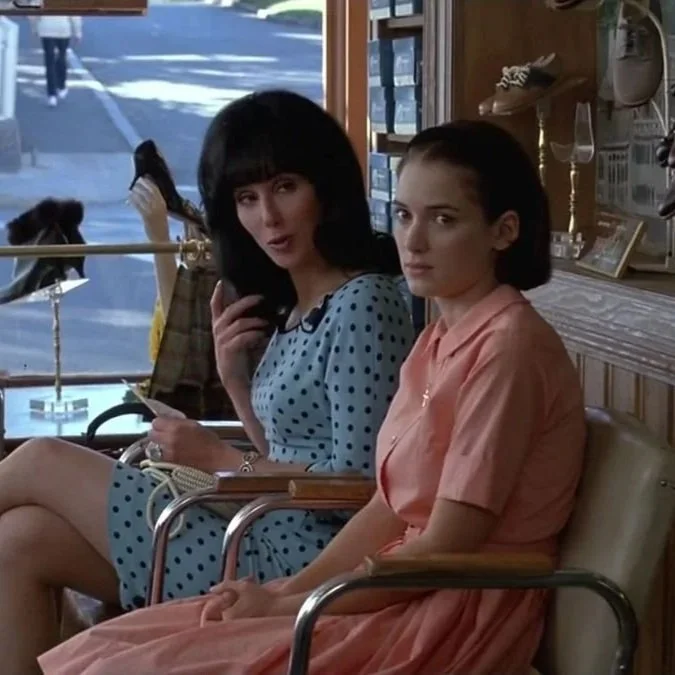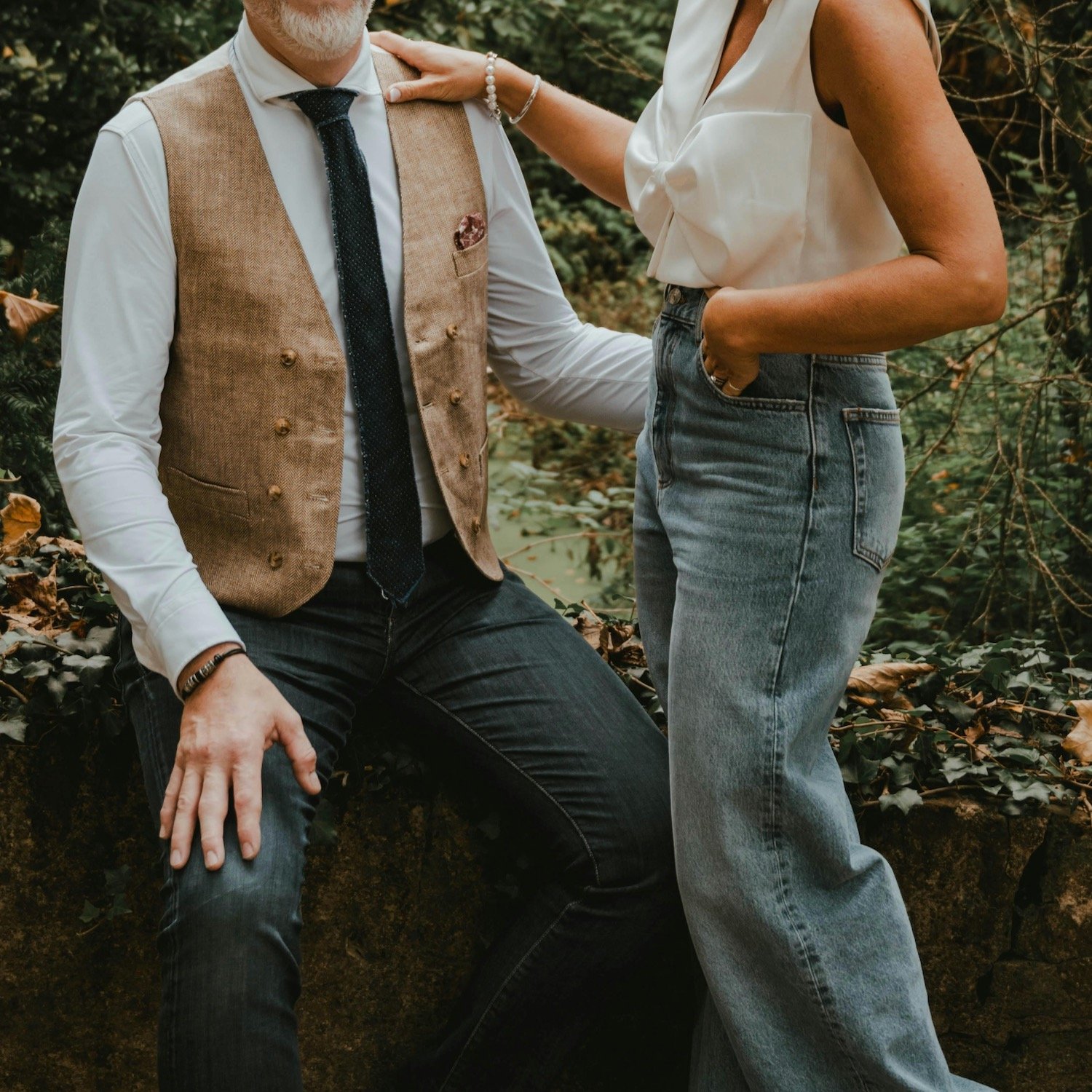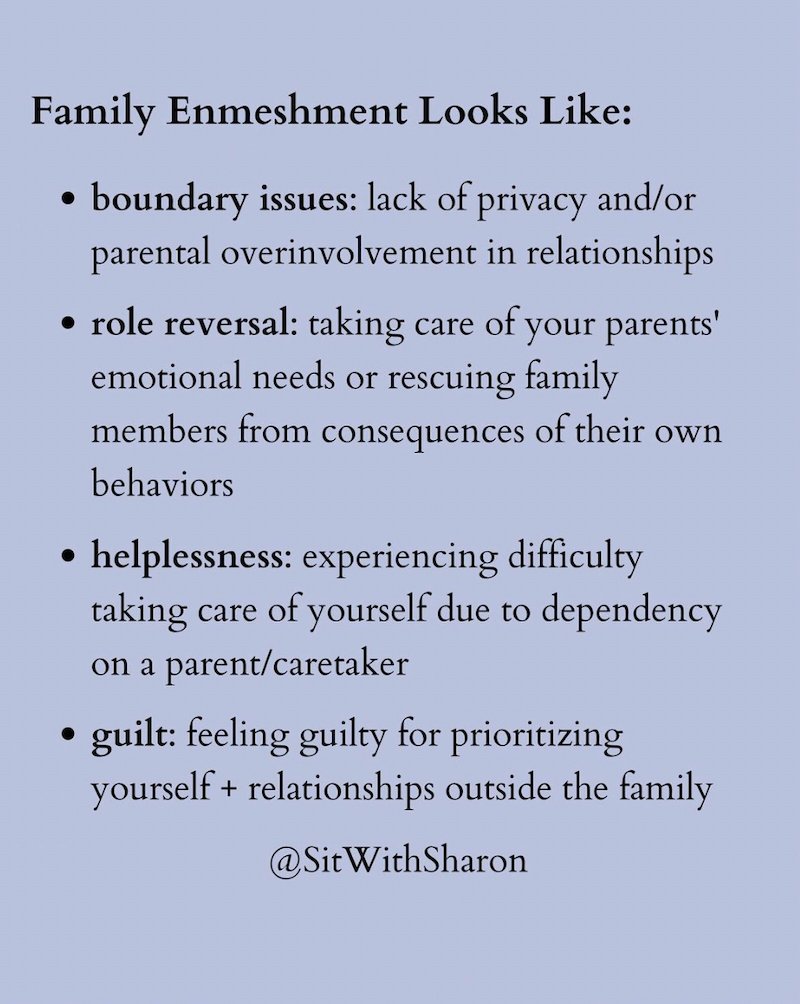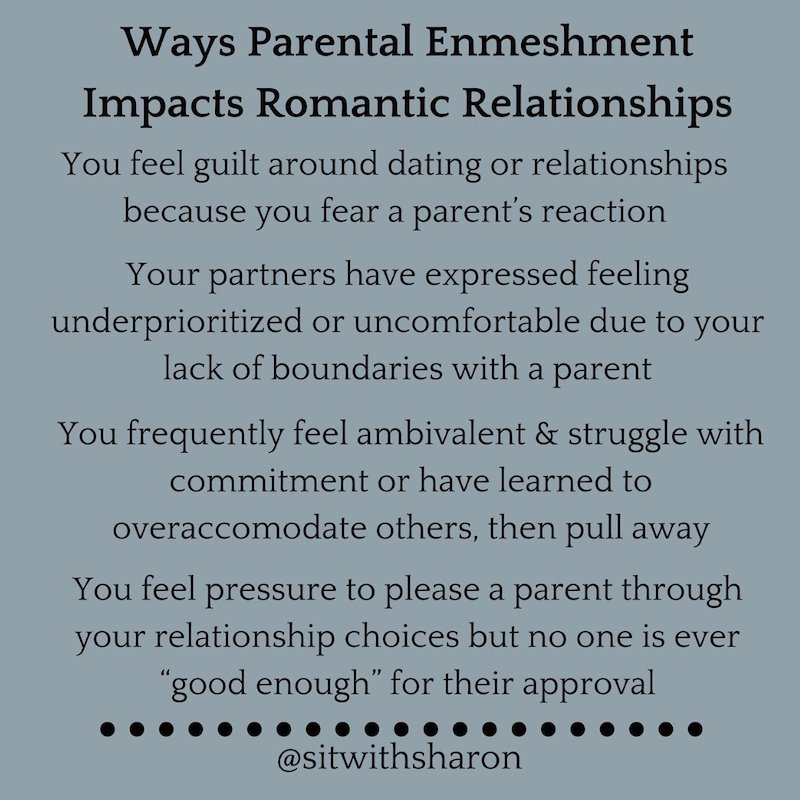7 Signs You Were Raised In An Enmeshed Family
by Marissa Pomerance
Growing up in a close-knit family often comes with a sense of comfort and pride. We’re so close. So loving. Not like those other families that only see each other once a year and can barely stand each other.
But there’s a point at which close can become too close. Like when your parents make you feel guilty for setting boundaries. Or when you feel the need to get your parents’ approval before buying a new car even though you’re 42 and spending your own money. Or when you feel like you can’t have differing opinions/views from your family because you don’t want to let them down.
That’s when this closeness becomes enmeshment. According to Licensed Psychotherapist & Relationship Coach Sharon Peykar, “enmeshment refers to a relationship dynamic, typically in families, where boundaries are non-existent or roles are unclear.” Here’s everything you need to know about enmeshment, and the signs to look for.
7 signs of enmeshment.
Of course, enmeshment looks different for every person and family, but here’s a non-exhaustive list of signs to look out for:
As a child, you were your parent’s confidante and source of emotional support. They were dependent on you to meet their needs.
You feel responsible for your parents/siblings happiness, and consistently put their needs ahead of your own.
Your parents call you “multiple times per day, unload their marriage difficulties on to you, or expect you to take care of their emotional needs when they are lonely,” suggests Peykar.
Your parents need to know everything about your life, and will make you feel bad if you want privacy or don’t want to share every detail.
You feel as though you're letting your parents down when you make different decisions than ones they approve of.
You take on “a parental role to your siblings, or triangulate them into conflict with parents,” says Peykar.
You define yourself by your role in your family, and you struggle to see yourself as your own unique person with different needs, desires, and goals.
Enmeshment is more than closeness or intimacy.
This doesn’t mean all close families are unhealthily enmeshed. “Our families can still be ‘close’ and ‘loving’ with appropriate boundaries,” says Peykar. In fact, a close-knit family can be wonderful. It can be a source of comfort, love, and support. It can be a refuge whenever we’re lonely or isolated. It gives us people in our lives we know we can always depend on.
So how do we tease apart healthy, close-knit family dynamics from unhealthy enmeshed dynamics?
Well, family dynamics “become damaging when we start to feel an overwhelming sense of obligation, guilt or resentment towards our families because we aren't living in alignment with the kind of life we want and deeply deserve. We may feel like we are ‘behind’ in terms of our relationship skills or in our ability to take care of ourselves independently,” Peykar suggests.
How enmeshment affects our adult relationships.
Are you tired of us telling you how things in your childhood affect your adult relationships, yet? Or how things that served us as children can be damaging to us now? No? Great, feel free to keep reading.
Enmeshment might be at the root of our most codependent behaviors, like people pleasing. “Some behaviors we may learn as a result of being enmeshed include taking on a caretaker role in friendships or relationships, difficulty identifying our physical or emotional boundaries, feeling responsible for our parents/caretakers' needs, conflict avoidance, difficulty with trusting others, and having a hard time knowing your needs,” says Peykar. We might struggle to say “no” to our family members, or do things for them because we feel we have to, not because we love them and want to help.
And enmeshment dynamics in childhood can particularly impact our adult relationships with our partners. We might struggle with intimacy, or codependence, or knowing how to self-soothe. We might constantly try to solve our partner’s problems because we take on their emotional burdens as our own.
Enmeshment can also be damaging when our familial relationships disrupt our marriages. Like if we take our parents’ side in a conflict, or choose our parents’ needs over that of our spouse. To some of us, taking our parents’ side or prioritizing their needs may even feel natural. But according to Peykar, “a secure marriage requires partners to keep their unit safe from outside parties, which includes in-laws. This means we need to hold firm boundaries around things like what is shared with our in-laws, what kind of help we are comfortable/not comfortable accepting, how frequently we spend time together, how we speak to each other, etc.”
Image from @SitWithSharon/Instagram
Why recognizing enmeshment is so hard.
Realizing our family is enmeshed is…not easy. A lot of us might resist acknowledging the possibility that our families are enmeshed, because it means confronting and dismantling a cozy, comforting narrative we have about our “close” and “loving” families, and recognizing the dynamics that can be damaging to our adult selves.
“We are protective of our family because they represent safety and familiarity for us,” says Peykar. Enmeshment can feel so warm and loving, we might rather remain enmeshed than deal with the fallout of differentiating ourselves. Not to mention, examining our family’s history of enmeshment might cast our loved ones and childhood memories into the kind of unflattering, harsh light we’ve been trying to avoid seeing our whole lives.
If it helps, being enmeshed doesn’t mean that your family is made up of evil, horrible people knowingly inflicting emotional harm. “Enmeshed families are families who are doing the best that they can with the tools they were given,” Peykar explains. “Most of us don't recognize enmeshment until we start making decisions that support our individuation from the family.”
Untangling the enmeshment.
Untangling ourselves from unhealthy enmeshment can be a long, blurry process.
But remember—the goal is to have better, more fulfilling relationships with our family, not to hate them or push them away. “Healing from enmeshment does not take away our closeness, rather it allows us to feel closer in a different way which includes space for our own values & personal goals to come to fruition,” says Peykar. “We are not seeking perfection in our healing process, rather we are looking for a space that allows us to redefine our roles in a more balanced way.”
Like any complex relationship/mental health dynamic, there aren’t always clear “steps” or a concrete action plan for healing. So instead, here are 3 ideas that might help:
Boundaries: If you grew up in an enmeshed family system, you know how scary boundaries can feel. I’m going to say NO to my mother?? But HOW? Setting boundaries doesn’t mean trying to control other people, or being mean. And there are a lot of different ways to set boundaries. “Boundaries can be physical, verbal, financial, etc. and will look differently for each person. Boundaries don't discourage closeness, they actually help us to feel close in a safer way,” says Peykar. We wrote an entire article on how to set firm boundaries with kind, clear language HERE.
Differentiation: Part of gaining a sense of independence from our family unit is seeing ourselves as separate individuals, and not defining ourselves through our family’s limited perspectives of us. This one word, differentiation, has the magic ability to help us do just that. Read about it HERE.
Therapy: According to Peykar, “therapy helps us disentangle enmeshment by learning how to develop our separateness and individuate from the family system while honoring our family relationships in healthier ways.” Learn how to find the right therapist for you HERE.
Marissa Pomerance is the Managing Editor of The Candidly. She’s a Los Angeles native and lover of all things food, style, beauty, and wellness. You can find more of her articles here.
This article is for informational purposes only. It is not intended to be used in place of professional advice, medical treatment, or professional care in any way. This article is not intended to be and should not be a substitute for professional care, advice or treatment. Please consult with your physician or healthcare provider before changing any health regimen. This article is not intended to diagnose, treat, or prevent disease of any kind. Read our Terms & Conditions and Privacy Policy.









